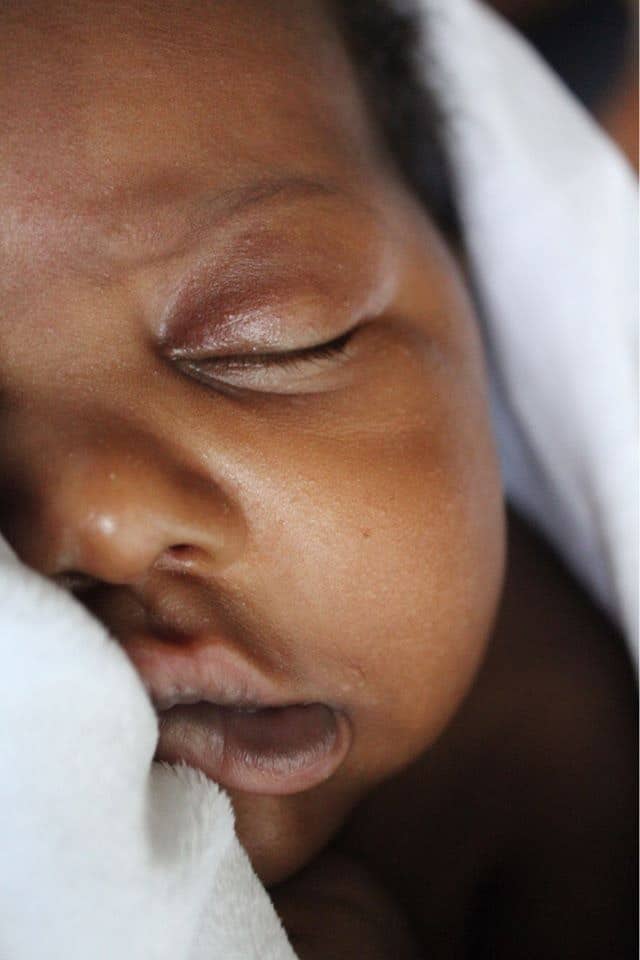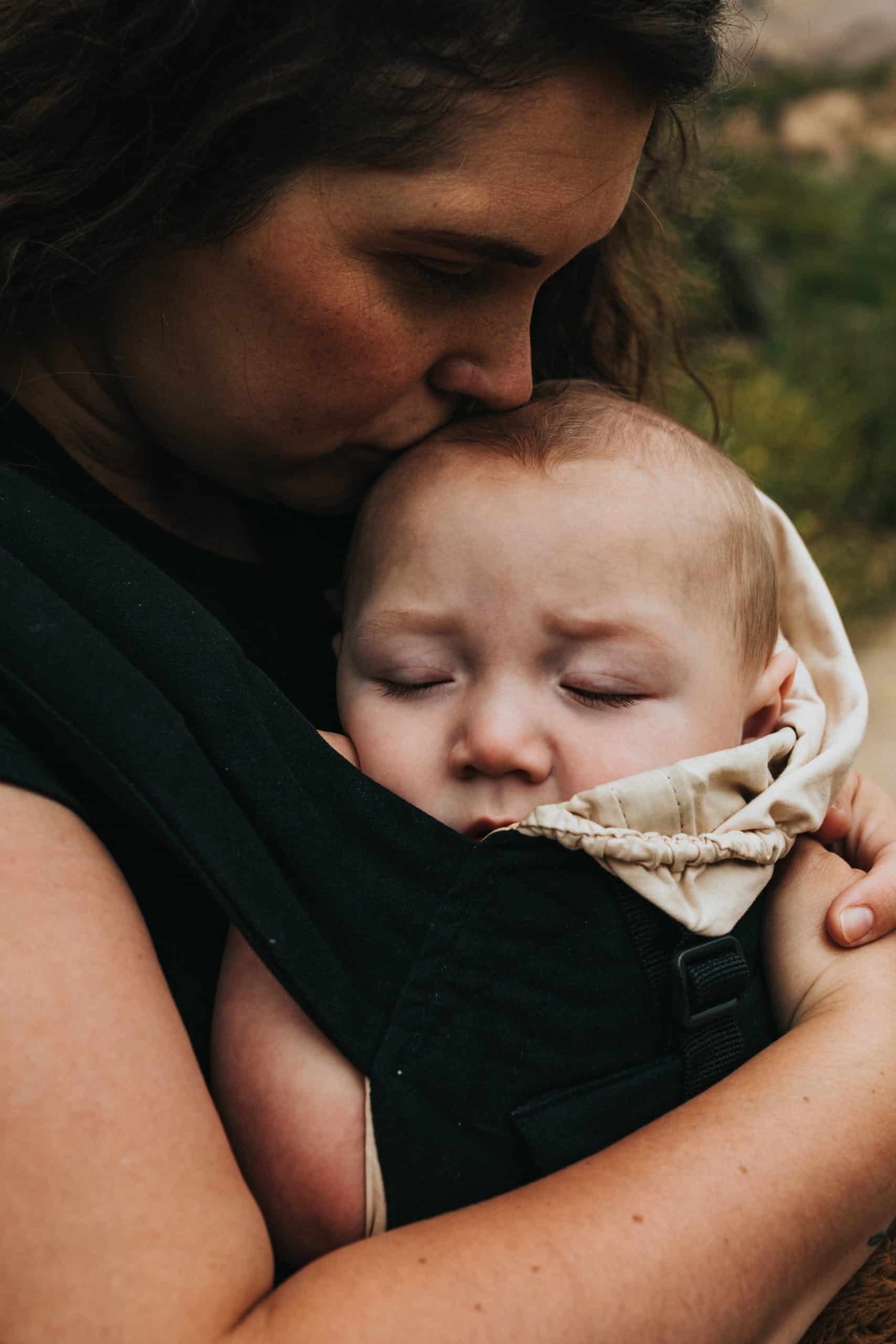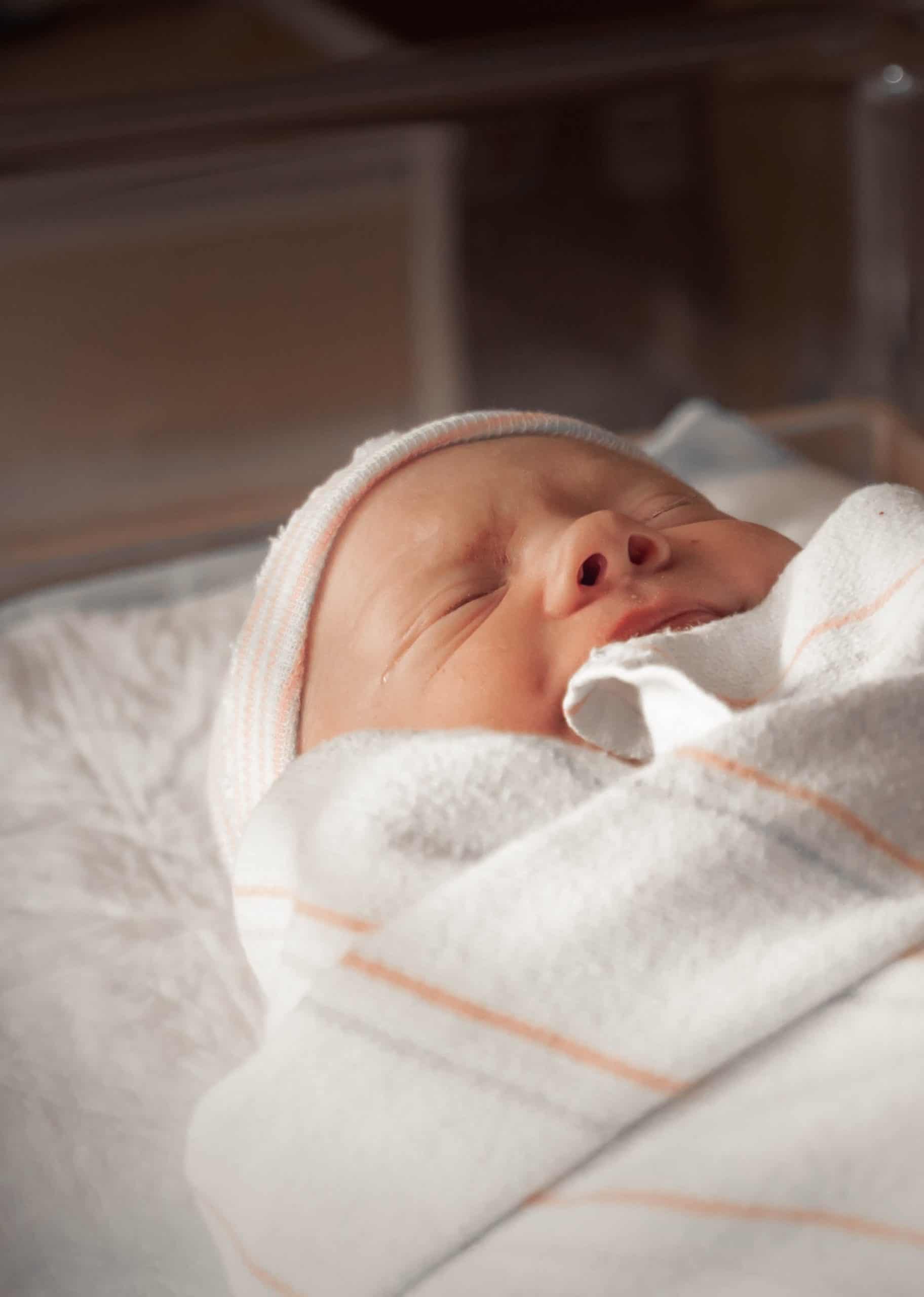Baby Settler Blog
Newborns: The First 28 Days of Life
Jaundice
Have you heard of jaundice? Jaundice is something your baby might experience during the newborn period. Typically, your baby will get a bilirubin (sounds like: billy-roo-bin) level check at 24 hours of life, and then again on the day of discharge. This level check will detect the amount of bilirubin/jaundice your baby may have.
A jaundice baby is going to have yellowing of the eyes. Typically, the yellowing starts from the head and then will move down and you may even notice your baby looks tan. My third child, Ruth, had beautiful olive skin the first few weeks of her life. Sadly, it wasn’t her natural complexion. It was the jaundice.
Usually bilirubin levels peak around day 5 of life. Jaundice can cause difficulties with feeding because the increased levels of bilirubin make babies tired. Feeding can become this vicious cycle of your baby not feeding well, then your baby isn’t peeing and pooping enough, and then the bilirubin level keeps rising because your baby isn’t peeing and pooping it out. If your baby is jaundiced, remember it can cause feeding issues, and if you’re breastfeeding, make sure to reach out to a Lactation Consultant for assistance with a feeding plan.
Frequency & Duration of Feeds
In the first 4 to 6 weeks of life, your baby is going to eat at least 8 times in 24 hours. Your baby must eat at least 8 times in order to grow due to the size of your baby’s stomach size. Now that we have established the amount of times a baby needs to feed, let’s discuss feeding specifics.
When we talk about feeding, whether breastfeeding or bottle feeding, you need to understand what it means to talk about frequency and duration.
When we talk about the frequency of a feed, we’re talking about the time interval between the first feeding and the next feeding. For example, if your baby feeds at 9 a.m, and then feeds at 12 p.m, that is a 3 hour feeding interval. Now, about duration; if your baby feeds at 9 a.m., and it takes her 30 minutes to feed, and we want her to eat within a 3-hour time interval, then you have a two and a half hour break between feeds.
Let me clarify further. Time interval is from the start of one feed, to the start of the next feed, and duration is how long it takes your baby to feed. Right now, I want you to remember your baby, from birth until 4 to 6 weeks, needs to eat at least 8 times in 24 hours to take in the volume and calories they need to feed and grow. Now, can there be exceptions to this? Yes. But those are exception outlined by your pediatric provider. This information applies to the majority of newborn baby’s during the first six weeks of life. (And it pays off to follow this advice for you and baby in the long run)
Note: In the Baby Settler Breastfeeding Made Simple Course, we go into more detail about frequency and duration and how it relates to breastfeeding.
How Do I Know My Baby Is Getting Enough?
Knowing the size of your baby’s stomach capacity is really important. It will help you be more confident during the period of time you’re waiting for your breastmilk to fully come in. Being in the initiation and colostrum stage of breastfeeding can be really hard. A lot of women worry their baby isn’t getting enough.
Baby’s Stomach Size
During the first 24 hours of life, your baby’s stomach is about the size of a cherry. It holds about 5 to 7 ml at each feeding. That’s a teaspoon. By day 3, your baby’s stomach is about the size of a walnut, and able to hold just under an ounce at each feeding. By the end of the first week, your baby’s stomach is about the size of an egg, and she’s able to eat between 1.5 to 2 ounces at each feeding. Once your milk has fully transitioned, after about 2 weeks, your baby is able to take anywhere between 2 to 4 ounces at each feeding during the first 4 to 6 weeks of life.
What to Look For
But how do you really know your baby is getting enough? Breastfeeding babies should be back to their birth weight by 2 weeks old and gain about 4 to 7 ounces per week after the first 2 weeks. Keeping track of your baby’s wet and poopy diapers will help ensure he’s getting enough. Be aware of first signs of dehydration: dry lips and dry mouth, fewer wet diapers, and maybe her urine looks dark. Babies usually become more irritable but very sleepy and difficult to wake for feedings. A sunken soft on your baby’s head is a sign of dehydration as well. Just keep these things in mind and always follow up with your baby’s provider if you’ve got concerns. Trust your gut!
Note: In the Baby Settler Babies Made Simple course we go into more details about dehydration and other worrisome signs and symptoms to look out for in babies.
Your baby should have periods of alertness after breastfeeding, followed by periods of content sleep. It’s normal to have days where your baby cluster feeds, but if you feel like your baby is constantly behaving hungry, you should reach out to a Lactation Consultant. Another thing to note: If you feel like your baby is needing to feed for at least 40 minutes at each feeding, every day, has slow weight gain, and seems to need to eat 10 or more times each day after the first 6 weeks, there could be something going on with the latch or with your milk supply. This would be another time to reach out to a Lactation Consultant.
Lactation Consultant
I’ve helped many exhausted MaMa’s who were desperate to make breastfeeding work. They couldn’t figure out why they were having issues. Sometimes it’s the latch. Sometimes it’s the milk supply. You really need to utilize a Lactation Consultant to help you figure out the best plan for moving forward. And Mama, let me tell you… There is NOT a one size fits all Lactation Consultant.
If you’ve had a bad experience with a Lactation Consultant, please try another one! I have met some Lactation Consultant’s that have the unapproachable mentality “breast is best” and who choose to ignore the real complications that can and do happen. They aren’t the only ones out there! I myself am a Lactation Consultant, and I take all the experience I’ve gained from all the my specialty areas, PLUS being a Mom, who had issues breastfeeding my own 3 children, and I help moms trouble shoot and make a plan that works best for them!
So, if you’ve had a bad experience, remember you’re not alone. I’ve met them too. But KNOW there are other Lactation Consultants out there and find the one you jive with!
Vitamin D and Breast milk feeding Babies
I love Vitamin D. The good ole sunshine AND the supplement. Vitamin D3 is a necessary vitamin for many body functions. We often don’t ingest foods rich in vitamin D3 or receive enough through only sun exposure. Vitamin D deficiency has even been linked to preterm labor and postpartum depression. I’m not saying it causes these things, I’m just saying there is a link.
Breastmilk feeding MaMa’s you need to take a Vitamin D supplementation while breastfeeding or pumping. Babies who are receiving breast milk exclusively, need Vitamin D supplementation. Mom’s can take 6400 units daily of Vitamin D or they can supplement their baby with oral vitamin D drops. It’s important to keep your Vitamin D dosage right at the 6400 unit mark, unless your provider tells you otherwise. You don’t want to take 10000 units if you don’t need to. You can get a 5000 unit, 1000 unit and most prenatal vitamins have 4-500 units in them. That’s how you get 6400 units daily.
Make a postpartum plan that supports your Breastfeeding/Pumping Journey
- Plan for pockets of sleep
- Work on getting effective, efficient feeds
- Make sure your baby isn’t getting overstimulated- pay attention to wake windows
- Triple Feeding is not sustainable. Work with a Lactation Consultant to help you come up with a plan that’s sustainable if triple feedings are still being required about day 7
I’ve got a FREE Postpartum Plan for you. It’s really important to identify resources that can help support you and your family during the postpartum period.
Hang in there Mama, you’ve got this!
Hillary
Ways to Get Your Partner Involved with Your Newborn Even if You’re Breastfeeding
From the moment you see those two pink lines, life as you know it changes forever. The journey into parenthood is exhilarating, yet it often feels like a roller coaster ride with no manual to guide you. For many new moms, especially those who are breastfeeding, it can...
The Default Parent (an opinion piece)
I want to start out by saying that I'm blessed to have an incredible partner in my husband. Honestly, there are many times when I sit back and compare myself to him and feel completely inadequate in my role as a wife and mother. He does it all- literally. He is an...
How to Choose the Best Pediatric Provider for your Family
How to choose the best pediatric provider for your family. Trying to choose the best pediatric provider for your family has always been a really important decision But honestly, I think it’s more important now than it ever has been. When I was having my first...
Expert Insights Delivered to Your Inbox
Follow Along
Meet Hillary
Courses
Consultations
Gift Certificates
Blog
My Amazon Shop
Write a Review
Terms & Conditions









